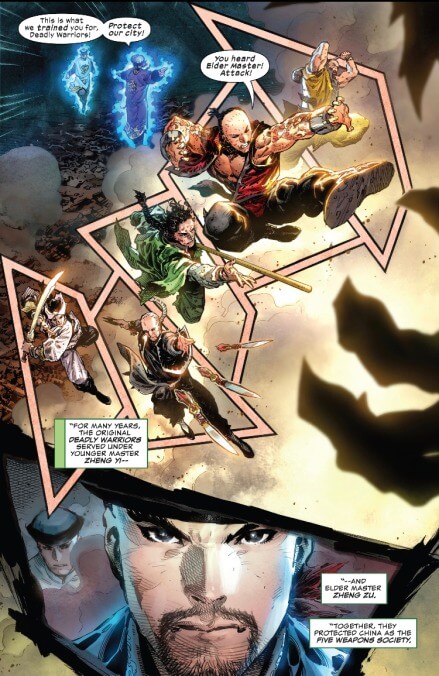Shang-Chi delivers kung-fu fun, even if it doesn't care about Shang-Chi

Avenger. Spy. Master of Kung Fu. Shang-Chi has inhabited all of these identities and more since 1973, and like countless other heroes before him, it’s time for a miniseries. Ahead of his big-screen debut courtesy of Simu Liu in next summer’s MCU movie, Shang-Chi #1 (Marvel) is a standard introductory issue that we’ve come to expect of many Marvel miniseries, but it’s also one that doesn’t seem to be interested in Shang himself.
That’s not to say Shang is a boring character in the issue. Gene Luen Yang writes him as a lovably charming guy, finding some fun in how ridiculous his life has been. Much like with Kong Kenan in DC’s underrated New Super-Man, it’s clear Yang has an affection for adorable himbos who rise to the occasion. One of the book’s best moments comes when he reveals to the reader why he chooses to talk how he does; Dike Ruan’s art gives him a softness that fits with the normal, unassuming life he’s trying to live while working in a Chinatown bakery with the lovable Grandma Wang.
All of that is good fun, as is Shang’s interplay with his ex Leiko Wu. All the same, it’s easy to come away thinking Yang cares more about Shang’s family than the man himself, who doesn’t show up until the issue is half over. The opening pages set during the Qing dynasty set up the overarching plot as Yang and flashback artist Philip Tan focus on a team of weapons-themed warriors dubbed the Five Weapon Society, led by Shang’s father Zheng Zu. (Formerly known as pulp baddie Fu Manchu, before Marvel lost the rights and had to change his name.) Tan’s art gives the warriors a sense of majesty as they leap into battle against Fin Fang Foom, and it does a great job of promising what could be possible with the present-day incarnations of the warriors, all of whom are Shang’s siblings. We meet them briefly throughout the story, and they all leave an impression with their different weapons. The villainous Sister Hammer is a lot of fun, as are boastful Brother Sabre and sarcastic Sister Dagger, first seen when they come to warn Shang that Hammer wants him dead. Like with New Super-Man, Yang loves giving his characters some family drama, and there’s nothing more dramatic than your sister carrying a big hammer and promising to kill you.
Shang-Chi’s biggest problem is that it feels more concerned with revamping the character’s father and supporting cast than telling a story about Shang himself. If you’re looking for a fun kung-fu book from Marvel, you’ll get what you’re looking for. But it also feels like it’s the free comic-book prologue to a larger story—one that’ll hopefully remember to bring its title character along for the ride.